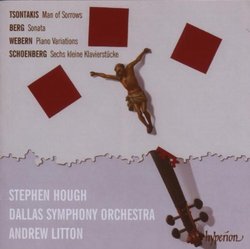An Instant Classic!
J Scott Morrison | Middlebury VT, USA | 08/15/2007
(5 out of 5 stars)
"This CD containing George Tsontakis's 'Man of Sorrows', with Stephen Hough, piano, and the Dallas Symphony under Andrew Litton, was released some time ago in Europe but released only today in the US. I had an early copy of it from England and have been living with it for the past month or so. I grow more and more enamored of it each time I hear it. The piece was premiered in Dallas in 2005 and got very good press at the time. Since its European release it has created immense buzz among those in the know. Could this be the next classical blockbuster like, say, Henryk Górecki's Third Symphony or Einojuhani Rautavaara's 'Cantus Arcticus'? Who knows? But I wouldn't bet against that notion.
George Tsontakis is a New Yorker in his mid-50s whose music I've been following for more than twenty-five years. I have yet to hear anything of his that isn't worthwhile. I'm particularly fond of his Four Symphonic Quartets, his piano quartets and his solo piano 'Ghost Variations', the latter also recorded by Stephen Hough. His style has evolved over the years and in latter times his music has been exploring paths initiated by Olivier Messaien. He brings to this absolutely gorgeous manipulation of sound a devotion to and gestural nod to masterpieces of the past. In the present work there is direct quotation of that motif Beethoven inscribed 'Muss es sein? ... Es muss sein' ('Must it be? ... It must be') from his last string quartet, the Op. 135. As well use is made of a brief harmonic sequence from the Diabelli Variations. 'Man of Sorrows' is partly in illustration of the religious inspiration of this work, the passion and crucifixion of Christ, particularly as depicted on a Byzantine ikon Tsontakis had seen in a Metropolitan Museum exhibit in 1997. (The striking booklet cover illustration of a crucifix is, however, by artist Anthony Mastromatteo.)
Musically 'Man of Sorrows' is more tone poem with prominent piano obbligato than classic piano concerto. Much of the piano part resides in the highest register of the instrument and there is often a birdsong-like quality to the right hand figurations. There is also considerable pianistic bell sound. All this is against a harmonically luxurious, usually slow-moving velvety chordal orchestral backdrop. Much of the music is pensive, but there are passionate climaxes, sometimes implying chaotic upheaval. There is no clear narrative thread, although the six movements have subtitles that connote aspects of Christ's passion and crucifixion. The overall effect of this almost 40-minute work is one alternately of devotion, dread, anguish, joy and acceptance. It is hypnotic in effect. Stephen Hough's playing is simply magnificent and the orchestral accompaniment shows the Dallas orchestra, one of our finest, at its best. Sound is demonstration quality.
The rest of the CD contains solo piano music played by Hough. He gives us a non-romanticized performance of the Berg Sonata, one with plenty of backbone. And we get two other brief classics from the Second Viennese School: Schönberg's Sechs kleine Klavierstücke, Op. 19 (1911) and Webern's Variations for Piano, Op. 27 (1935-6) in exemplary performances.
The CD concludes with a six-minute bijou by Tsontakis, his 'Sarabesque' (named for its dedicatee, Houston pianist Sarah Rothenberg, and previously recorded by her). Hough gives this delicate bagatelle a pellucid reading.
Most urgently recommended!
Scott Morrison"
A Luminescent "Oratorio" for Piano and Orchestra
John S. Hilliard | Washington, D.C. United States | 08/01/2009
(5 out of 5 stars)
"Addressing the concerto only on this CD: I teach a graduate course on 20th to 21st-century Piano concerti. This unique and spectacular work by George Tsontakis is at the top of my list. The piano concerto in the last hundred years has been represented by a host of masterpieces, from Stravinsky to Schoenberg to Bartok (3) to Messiaen (not titled as concerti) and Schnittke, to name a few of these. May I add to the list this sublime one by Tsontakis. Perhaps it might be better to describe it as an oratorio for orchestra and solo pianist. For it, a work which through a series of non-literal portrait movements, manifests the life of Christ.
Technically speaking, the concerto, somewhat resembles another medium which has commemorated reverence for Jesus's life in visual terms: Mosaics. However, one need not even know the concerto is an homage to anything or anyone to hear its luminescent beauty; orchestrated with breath-taking skill for color and balance. The ideal for judging of musical art often is cited as masterful technique in the service of profound substance. This work demonstrates that ideal.
The performance by Stephen Hough and the Dallas Symphony is superb. I Highly recommend it to anyone who loves piano concerti, orchestral works, or new music."


 Track Listings (17) - Disc #1
Track Listings (17) - Disc #1